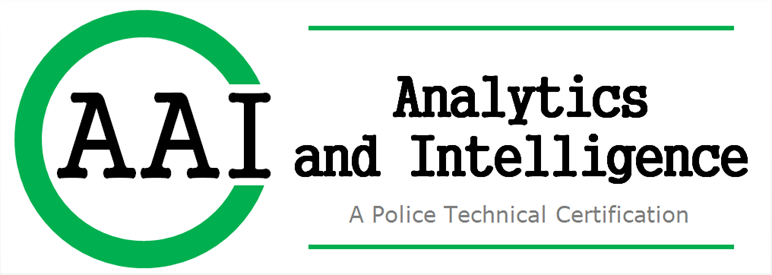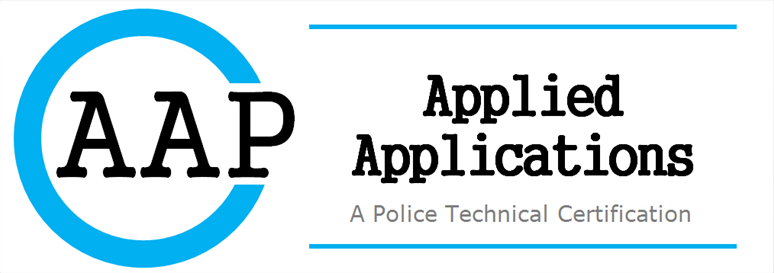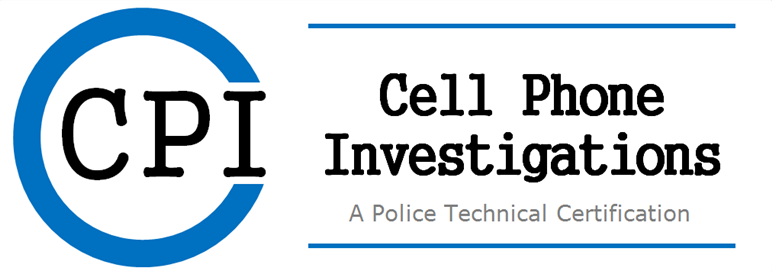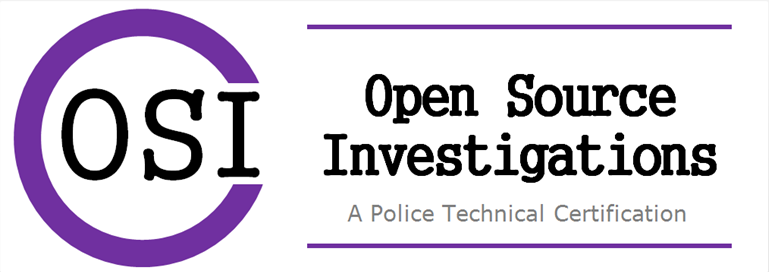In 2014 POLICE TECHNICAL authorized the recognition and certification of personnel who successfully completed course work and comprehensive exams in 5 different tracks of instruction. Completion of a single track entails no less than 80 hours of course work. Each Certification Track consists of one (1) Primary Course, three (3) Core Courses, and one (1) Elective Course.
Certification is currently only open to active law enforcement personnel. Personnel who have attended POLICE TECHNICAL classes between Jan 1, 2012 and December 31, 2013 will be grandfathered into the Certification track without testing.
1. What is AAI Certification?
AAI certification is nationally recognized as the standard of achievement for personnel who provide analytical and intelligence support for law enforcement departments and agencies.
Law enforcement departments need personnel who possess the expertise to provide criminal and statistical analysis in: cell phone data, cell tower/site mapping, and the general presentation of statistical, digital, and computer related evidence to decision makers and in court.
The skills that AAI certification evaluates are the building blocks of success in the field.
2. Why AAI Certification?
In the post–terrorism environment personnel tasked with analyzing national security information for threats increasingly worked for state and local law enforcement. Agencies first accessed these professionals through federal grants and fusion centers, but the demand for intelligence analysis has outpaced capacity in many areas. To better support law enforcement’s needs, POLICE TECHNICAL began providing training in analytical techniques. These original training courses created the foundation of the national AAI Certification offered today.
3. Who earns AAI certification?
AAI Certification is designed for:
- Sworn law enforcement personnel: to apply analysis techniques to criminal investigations and reduce their reliance on analysts for case support
- Non-sworn support personnel: to better support analytical assignments in a law enforcement environment
- Analysts: to provide training beyond that of state and federal entities and to improve communication in the workplace and courtroom
- Specialized unit supervisors: to understand data their officers and analysts generate
- Agency executives: to make stronger decisions for their department and community
4. Benefits
Benefits of the holding the AAI Certification include:
- Nationally recognized mark of excellence in analytics
- Showing dedication to continuing education
- Validating knowledge of analysis and intelligence in the law enforcement field
- Increased value to peers, agency, and community
- Competitive advantage of the holder over peers when seeking promotion
5. How to Become AAI Certified
To achieve AAI Certification candidates must successfully complete the primary course, three supporting core courses, and an one elective course.
Primary Courses
Analytics for Public Safety
Analytics: The discovery and communication of meaningful patterns in data. Making a difference for a department is more than
building a case. Analytics for Public Safety combines foundational techniques with decision making skills.
Excel for Public Safety
Get the most out of the program you use daily. Even experienced analysts have benefited from the techniques, lessons and
instruction with this course.
PowerPoint for Public Safety
This is the national standard for the presentation of law enforcement related data. Make bomb proof PowerPoint presentations for
your department and for court. Learn the same techniques prosecutors use in capital murder jury trials: how to build them and,
more importantly, how to deliver them.
Elective Courses
Analytic Unit Supervisor
Designed to assist supervisors grow, develop, and manage their analytical services personnel and division. Whether an agency has a
single strategic analyst or a team of real-time analysts, this course provides supervisors with the guidance to effectively manage (and
grow) their analytical staff. Practical exercises and leadership/staff assessment are emphasized.
Critical Thinking for Law Enforcement
This course outlines the processes for thinking objectively and critically about data processes and procedures related to law
enforcement activities / investigations. Learn how to critically (and accurately) examine and process data sets, accept and reject
hypotheses, and present clear directions to peers and administrators. Hands-on exercises are emphasized.
i2 Analyst Notebook
Analyst Notebook helps analysts and investigators discover networks, patterns, and trends from volumes of data from multiple sources. POLICE TECHNICAL provides an in-person consultant/trainer to review and assess agency needs, followed by agency-
specific, task-specific, customize training to select personnel.
OneNote: Digital Case Management
This course provides practical application experience for law enforcement personnel working with MICROSOFT OneNote®. OneNote is highly capable of managing, storing, and sharing investigations materials but is often overlooked for more expensive, proprietary solutions. Law enforcement investigations / case studies are used throughout the course.
Power BI for Law Enforcement
This course provides a law enforcement specific approach towards utilizing Power BI for agencies. Power BI gives analysts the opportunity to work with a powerful yet user friendly program that focuses on intelligence capabilities. Students will learn how to
harness the capabilities of this program through hands-on instruction.
As well as any course not required for the certification
6. General Requirements
- Certification tracks are comprised of 5 POLICE TECHNICAL classes, totaling 80 hours of training
- Courses may be taken in any order, within 2 years of the first class
- Candidates must achieve 80% or higher on the post-course examination
- Candidates must submit a written request and course documentation for Certification Award
7. Maintain your Certification
Certifications may be renewed annually after the initial 2-year period if the holders take a 16-hour course from the original certification track series. They must do this within their second year of being awarded certification.
Certifications may be renewed annually, indefinitely.
Certifications that have lapsed may be renewed on an individually based committee review.
There is currently no additional cost for certification (beyond that of the initial training). There is no cost for testing or renewal.
Questions? Email info@policetechnical.com or call 812-232-4200.
1. What is AAP Certification?
AAP Certification is the nationally recognized standard of achievement for law enforcement officers and intelligence analysts who utilize standard office productivity applications.
Office productivity software is common within law enforcement, but most departments do not provide training to use the software. Most personnel are self-taught and the few with some training receive it from college or local government sources not associated with law enforcement.
Skills gained from this certification provide a foundation for successful development in all areas of law enforcement. AAP leads to strengthened performance in analysis, administration, documentation investigations as well as public and courtroom presentations.
2. Why AAP Certification?
A person who has gone through AAP certification knows the proper way to leverage desktop software for an agency’s benefit. Not even the software manufacturer can provide this level of training. Simply put: the software developer doesn’t know what law enforcement does with their software, and honestly because the market is small, they don’t care.
Law enforcement academies and agencies understand the need for training and certification. Weapons, driving, and defensive tactics require proven proficiency for an officer to maintain the status. Historically, word processing and other data related tasks were the domain of support personnel and secretaries. In the age of mobile data terminals, laptops, and tablets in every squad car, this outdated thinking is no longer the case. Police officers need a complete understanding of these systems as much as they must comprehend radio operations and case law.
3. Who earns AAP Certification?
AAP Certification is designed for:
- All sworn law enforcement personnel: to apply the best practices to software packages, improving every aspect of their jobs.
- Intelligence officers and crime analysts: to provide them with techniques to speed up analysis and document development, enhancing their ability to present cases internally and in court.
- Training personnel: to assist with developing instructional materials, supporting documents for certification and accreditation, and improving organization of required annual training and supplemental in-service training.
- Tactical personnel: to learn new capabilities that support intelligence gathering, warrant documentation, raid planning and development, mission briefs/debriefs, and presentations for internal use and in court.
- Supervisors and administrators: to enhance their understanding of the capabilities of off-the-shelf software packages and what products and performance can be expected from fully trained personnel.
4. Benefits
Benefits of the holding the AAP Certification include:
- Nationally recognized mark of excellence in investigations
- Validating knowledge of common desktops applications
- Recognition of work and educational experience, providing you with increased credibility the workplace and in courtroom.
- Increased value to peers, management, agency, and community
- Competitive advantage of the holder over peers when seeking promotion
5. How to Become AAP Certified
To achieve AAP Certification candidates must successfully complete the primary course, three supporting core courses, and an one elective course.
Primary Courses
Effective Writing for Public Safety
This course provides a law enforcement-specific approach to learning how to efficiently utilize Microsoft WORD. Unlike a typical computer course, personnel learn through a series of guided “real-world” applications which identify and hone how law enforcement agencies utilize software to create written documents for internal and external agency use.
Excel for Public Safety
This course provides practical application experience for law enforcement personnel working with MICROSOFT EXCEL®. In a primarily hands-on environment, personnel are guided through a series of examples to better learn how to effectively leverage Excel
for law enforcement and public safety.
PowerPoint for Public Safety
MICROSOFT PowerPoint is the international standard for the presentation of ideas and data. In this course, students learn how to specifically apply this tool to a law enforcement environment. Case studies range from Instruction to Investigations, Narcotics to Homicide. Thousands of law enforcement personnel have taken this course from POLICE TECHNICAL.
Elective Courses
Excel: Special Topics
This course provides an in-depth look at Excel, going over the more advanced features that the program offers. Extensibility focus is key here: VBA, Advanced Pivot, Data cleaning, mapping, and functions like vlookup/xlookup.
OneNote: Digital Case Management
This course provides practical application experience for law enforcement personnel working with MICROSOFT OneNote®. OneNote is highly capable of managing, storing and sharing investigations materials but is often overlooked for more expensive, proprietary solutions. Law enforcement investigations / case studies are used throughout the course.
Power BI for Public Safety
This course provides a law enforcement specific approach towards utilizing Power BI for agencies. Power BI gives analysts the opportunity to work with a powerful yet user friendly program that focuses on intelligence capabilities. Students will learn how to
harness the capabilities of this program through hands-on instruction.
As well as any course not required for the certification
6. General Requirements
- Certification tracks are comprised of 5 POLICE TECHNICAL classes, totaling 80 hours of training
- Courses may be taken in any order, within 2 years of the first class
- Candidates must achieve 80% or higher on the post-course examination
- Candidates submit a written request and course documentation for Certification Award
7. Maintain your Certification
Certifications may be renewed annually after the initial 2-year period if the holders take a 16-hour course from the original certification track series. They must do this within their second year of being awarded certification.
Certifications may be renewed annually, indefinitely.
Certifications that have lapsed may be renewed on an individually based committee review.
There is currently no additional cost for certification (beyond that of the initial training). There is no cost for testing or renewal.
Questions? Email info@policetechnical.com or call 812-232-4200.
1. What is CPI Certification?
CPI Certification is the nationally recognized standard of achievement for law enforcement officers and intelligence analysts who investigate crimes where a mobile device, call detail records, and/or cell site may yield evidence.
Criminals utilize cell phones to plan, execute, and evade apprehension. Law enforcement can use mobile phone technology against criminals and their ongoing enterprises. CPI Certification gives law enforcement officers of any background an arsenal of tools such as: legal principals on search and seizure, proper physical and digital evidence handling, recovering evidence from phones, call detail record analysis, cell tower/cell site tracking and mapping, and controlling communications in a tactical environment.
Skills gained from completing the CPI Certification lead to successful criminal investigations and conspiracy crimes investigations such as drug trafficking and gangs. Certification holders are competent in investigating multiple facets of mobile device and communications cases.
2. Why CPI Certification?
Mobile device investigations are complex. Numerous sources can be used for evidence and intelligence including the device, records the service provider maintains, and application data. Most training courses only address an avenue of investigation without considering other possibilities. Additionally, agencies may struggle with a budget, allocating scarce funds to get one piece that will meet their needs, only to find they can’t recover what the key evidence required for their cases.
CPI certification courses are vendor neutral. The core courses are presented so that every investigator or analyst who attends is equipped with the resources to exploit all available information.
3. Who earns CPI Certification?
CPI Certification is designed for:
- Sworn law enforcement personnel: to apply cell phone investigative techniques to practically every criminal investigation.
- Intelligence officers and crime analysts: to show them available resources and improve their ability to present cases internally and in court.
- Forensic analysts: to supplement their existing skill set with new techniques and equipment, including the use of alternative forensic software and avenues of investigation beyond the device.
- Tactical personnel: to learn abilities that can be applied directly to critical incidents such as barricaded suspects and hostage negotiations as well as fugitive and missing persons cases.
- Specialized unit supervisors: to enhance their understanding of existing investigative capabilities and budgetary issues involving cell phone investigations, and to improve policy recommendations.
4. Benefits
Benefits of the holding the CPI Certification include:
- Nationally recognized mark of excellence in investigations
- Showing dedication to continuing education
- Validating knowledge of cell phone investigative techniques
- Recognition of work and educational experience, providing you with increased credibility internally and in court.
- Competitive advantage of the holder over peers when seeking promotion
5. How to Become CPI Certified
To achieve CPI Certification candidates must successfully complete the primary course, three supporting core courses, and an one elective course.
Primary Courses
Cell Phone Data and Mapping
Make sense of the data, find patterns, and clearly map the movements of the cell phone. Pen-Link and Analyst’s Notebook are great, but it’s time to learn something new.
Cell Phone Investigations
This demonstrates how to obtain evidence and intelligence from cell phones, cell towers/sites, call detail records, and applications using existing resources. Cell Phone Investigations presents the knowledge needed to immediately begin applying new skills to all cases. This course includes a comprehensive overview of cell phone investigations from obtaining data, case development, investigations, and courtroom presentation and prosecution.
Real Time Cell Phone Investigations
This course provides law enforcement personnel instruction in accessing cell phones and cellular data in real-time. Starting off with basics in cell technology the course quickly progresses into applications using all of the major cellular carriers. Personnel will have real world, working knowledge of how to apply course information to active investigations.
Elective Courses
Excel for Public Safety
Get the most out of the program you use daily. Even experienced analysts have benefited from the techniques, lessons and instruction with this course.
Excel: Special Topics
This course provides an in-depth look at Excel, going over the more advanced features that the program offers. Extensibility focus is key here: VBA, Advanced Pivot, Data cleaning, mapping, and functions like vlookup/xlookup.
As well as any course not required for the certification
6. General Requirements
- Certification tracks are comprised of 5 POLICE TECHNICAL classes, totaling 80 hours of training
- Courses may be taken in any order, within 2 years of the first class
- Candidates must achieve 80% or higher on the post-course examination
- Candidates must submit a written request and course documentation for Certification Award
7. Maintain your Certification
Certifications may be renewed annually after the initial 2-year period if the holders take a 16-hour course from the original certification track series. They must do this within their second year of being awarded certification.
Certifications may be renewed annually, indefinitely.
Certifications that have lapsed may be renewed on an individually based committee review.
There is currently no additional cost for certification (beyond that of the initial training). There is no cost for testing or renewal.
Questions? Email info@policetechnical.com or call 812-232-4200.
1. What is OSI Certification?
OSI Certification is the nationally recognized standard of achievement for law enforcement personnel, analysts and supporting staff whose responsibility is the investigation, case development and prosecution of criminal behavior and actions which intersect with internet/web-based activity.
Most crime has an online nexus. Whether it is the photographic evidence of the crime itself posted to a social media channel, the sale of stolen merchandise listed on a online marketplace, or the solicitation of minors in chat rooms, each of these real world crimes have a very footprint in the online world. The OSI certification track seeks to first, expose law enforcement personnel to a world, which in some cases they didn’t even know existed, and then secondly, to show them how to investigate the activities of that world as if it were a physical space.
Skills gained from completing the OSI Certification provide personnel a foundation for successful online investigation of real world criminal acts. With this certification personnel will be competent in applying the best practices for proactively investigating criminal behavior across the entire spectrum of online and social media services including well known sites like Facebook and Google and less traveled spaces such as the Dark Web.
2. Why OSI Certification?
Open source investigation seeks the utilize the best in openly available (i.e. free) software and platforms to investigate criminal activities. Certification in this field is important because of the huge gulf often associated with what criminals doing and what law enforcement can prove in a court of law. Law enforcement typically knows it is “behind”. Behind in current technology. Behind in current processes. And behind in current criminal trends. This is no less true regarding criminal activity online. With the ability of criminals to change locations and appearances within a few minutes (online) investigators need to follow a proven track to succeed in this space.
The OSI certification ensures personnel are equipped to effectively investigate the online world without regard to any specific site or technology. It demonstrates the best practices for leading proactive investigations as well as responding to criminal reports.
3. Who earns OSI Certification?
OSI Certification is designed for:
- Investigators and Detectives: to provide them with a practical foundation for the investigation and management of criminal cases involving the internet.
- Investigation Supervisors: to provide them with a working knowledge of the capabilities of, and the requirements for an online investigator.
- Technology Support Personnel: to provide them with the process and tools to effectively support online investigation details.
- Analysts: to provide them with the an overall goal of an online investigation detail so they might better support, and in many cases, guide the overall efforts of the agency.
4. Benefits
Benefits of holding the OSI Certification include:
- Nationally recognized mark of excellence in investigations
- Showing dedication to continuing education
- Confirming your commitment to integrated, proactive investigations which benefit the community
- Demonstrating you have acquired the skills to lead an online investigation
- Recognition of work and educational experience, giving you increased credibility internally and in court
5. How to Become OSI Certified
To achieve OSI Certification, candidates must successfully complete the primary course, three supporting core courses, and one elective course.
Primary Courses
Dark Web Investigations
Students will learn how to comprehend each level of the web, from the surface (Google) down to the “deep” or “dark” sections. The course uncovers the criminal offenses and investigative techniques associated with the dark web. Current trends and future
directions are discussed. Security protocols are observed in class to protect agency assets and identity.
Find Anyone Online
Find, Track, and Apprehend suspects using the latest digital/online methods. Suitable for any person who ever wanted to find somebody – immediately.
Open Source Investigations
Foundation for the Open Source Investigations track. This course provides information, sites, and process for investigations using (predominately) free, open, public sources of information. Portions of the course are hands-on and will require personnel to have a
laptop with unfettered access to the internet (no site blocking software).
Elective Courses
Cryptocurrency Investigations
Cryptocurrency is quickly becoming a standard for online financial transactions. Students will gain a better understanding of the recent history of cryptocurrency, its origins, and applications. Investigative techniques will be outlined which unlock criminal and questionable online financial practices. Courtroom presentation of online evidence is emphasized.
Internet of Things (IoT) Investigations
Internet of Things (IoT) is the term given to the growing world of internet connected devices. As more and more “things” become connected to the internet (and each other), their investigative value increases to law enforcement. This class explores the current
(and near future) applications for IoT in law enforcement investigations and operations.
Securing Your Identity Disappear from the Internet. Whether you are working active online investigations, or simply want to maintain better control of your online identity, students learn to make private communications, anonymous internet connections, hardened computers, secure accounts, and secret purchases. Become invisible online in the interest of officer and personal safety.
Technology for Detectives
This course will teach the new investigator how be digitally proficient in the use of technology to become a more efficient investigator. This course will also teach the basic of investigations where technology may hold vital clues to help solve your case.
As well as any course not required for the certification
6. General Requirements
- Certification tracks are comprised of 5 POLICE TECHNICAL classes, totaling 80 hours of training
- Courses may be taken in any order, within 2 years of the first class
- Candidates must achieve 80% or higher on the post-course examination
- Candidates submit a written request and course documentation for Certification Award
7. Maintain your Certification
Certifications may be renewed annually after the initial 2-year period if the holders take a 16-hour course from the original certification track series. They must do this within their second year of being awarded certification.
Certifications may be renewed annually, indefinitely.
Certifications that have lapsed may be renewed on an individually based on committee review.
There is currently no additional cost for certification (beyond that of the initial training). There is no cost for testing, or renewal.
Questions? Email info@policetechnical.com or call 812-232-4200.
For more information about POLICE TECHNICAL Certification Tracks and training please contact Ashlee Waters at awaters@policetechnical.com or at 812-232-4200.






